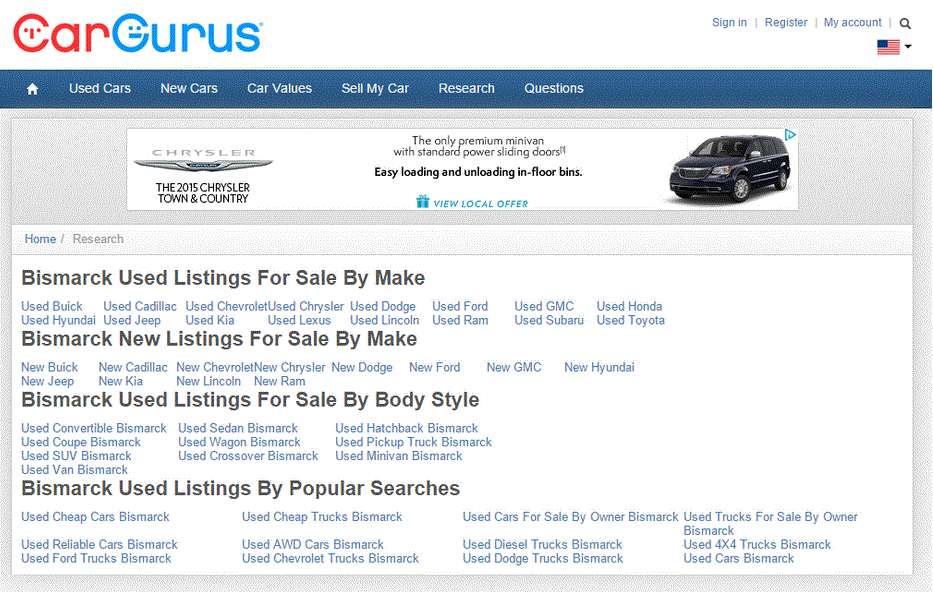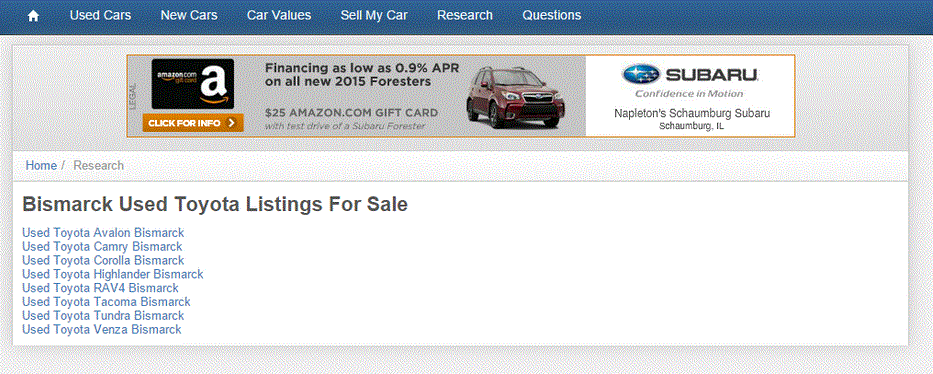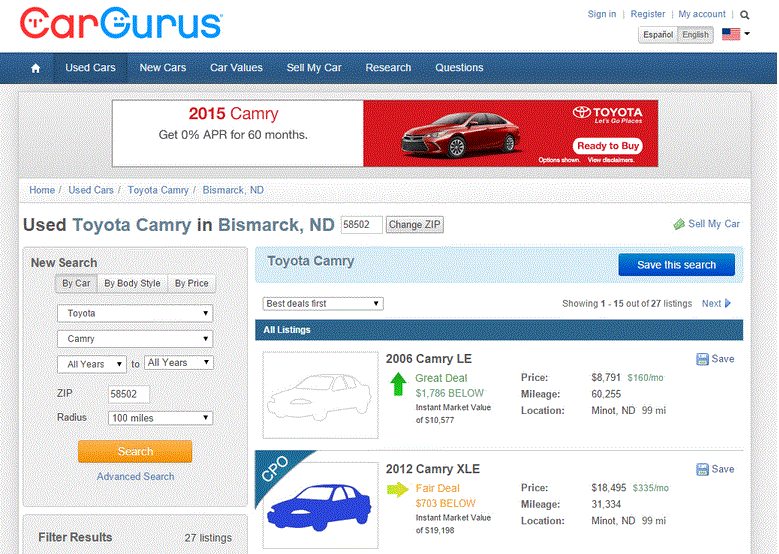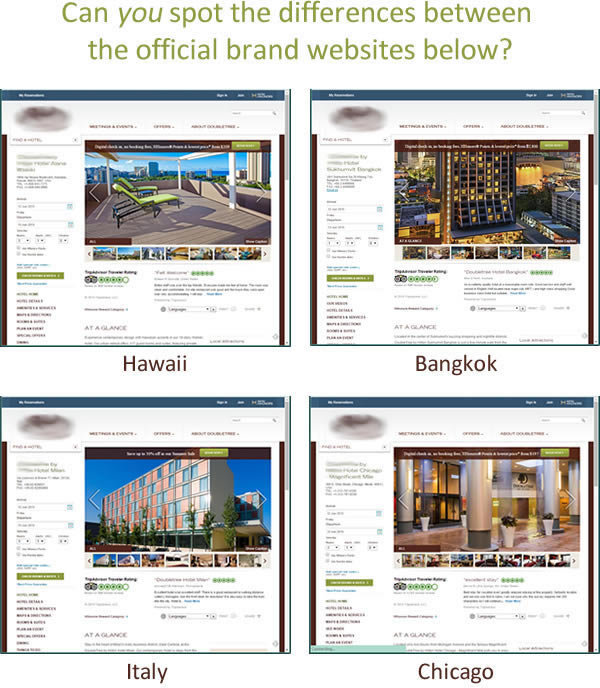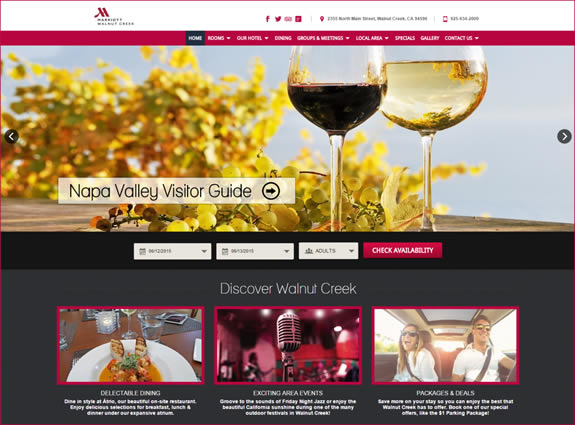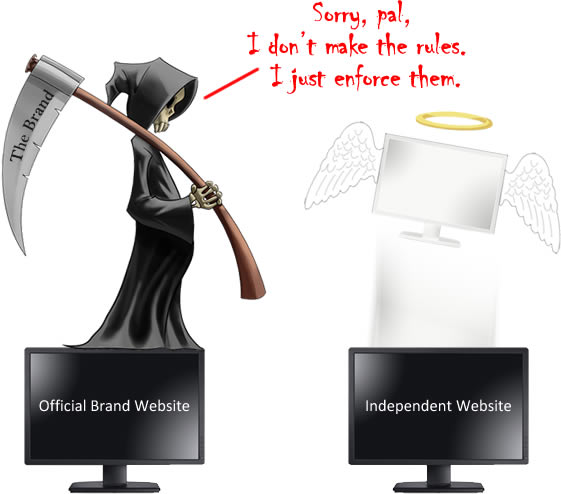On March 16, 2015, Google announced another update to its ranking algorithm. Like many of these updates, the search behemoth set its crosshairs on one of the many forms of webspam known to plague search results: doorway pages. Rest assured, this is a good thing. Doorway pages clutter search results with worthless, low content web pages and should be removed. There was no question that Google’s doorway page update was unleashed with noble intent. And, in fact, most scrupulous digital marketers welcome this kind of spam cleansing by search engines. Many a ne’er-do-well of the SEO world, on the other hand, use tactics like doorway pages to game the search engines and get higher rankings. It’s those sites that are the target of Google’s update.
The Doorway Dilemma
Nevertheless, confusion and controversy arose when legitimate business owners across the globe attempted to understand exactly what Google considers to be a doorway page. Google gave some basic guidelines and even gave their definition of this offending content, but it was still difficult to say where the fine line was drawn between doorway pages and legitimate content, like, say, landing pages. In the past, Google has occasionally been pretty heavy handed in its updates, and unfortunately legitimate websites of many a business had been struck down by Google’s aggressive execution of that update–collateral damage in the search engine’s quest for a cleaner web. And now with the doorway page update, many site owners–still reeling from the aftermath of similar updates in the past–worry that the Sword of Damocles once again sways ever-so precariously above their domain.
Hotel Brands React To the Google Update
It wasn’t long before many large hotel brands caught wind of this update. Most brands reacted calmly, realizing that it was prudent to keep an eye on the impact of this update, but premature to make any assumptions about what Google may or may not deem a doorway page. One major brand, on the other hand, went into panic mode. “What if Google sees our secondary, independent hotel websites as nothing more than a doorway page to the hotel’s official brand website!” the brand exclaimed, wringing their hands in nervous anticipation. For hotels within that brand, it was a terrible, horrible, no good, very bad day.
Soon, a great panic had swept across the hotel brand, the impending doom of Google placing a pox on their pure brand rankings. The brand saw this update as a zombie bite and feared that soon the infection of poor Google rankings may spread from hotel to hotel within the brand like the plague of the undead. So, in response, just as any sensible person would do with an extremity that suffers a zombie bite, the hotel brand decided to sever their seemingly diseased independent website limbs in order to save their official brand website body. Their thought being that by removing the independent websites from the web, Google would no longer penalize the brand for being infected with these alleged doorway pages. Problem solved, right?
Of course, on the other hand (literally speaking, assuming said anti-zombification measures were taken), if the limb wasn’t really plagued with the infection, then you’ve clearly just lost a perfectly functional and valuable appendage for no good reason. Case in point, many of these independent hotel websites produce approximately 20% of the property’s total online reservations. Hopefully this hotel brand has some good first aid training, because there will be a lot of blood lost when it needlessly removes those revenue-producing independent site limbs.
While this particular brand has already made its decision based on specious evidence, the ultimate question is: Will Google penalize the website of a hotel or its parent brand for marketing a secondary, independent website in addition to the official brand website? First, it helps to understand what Google classifies as a doorway page.
Google’s Definition of Doorway Pages
In typical Google fashion, the definition of a doorway page has been about as clear as a photo of the Loch Ness Monster. Most people know that Nessie is supposed to be interpreted as some sort of aquatic dinosaur, but both mythological creature experts and laypeople alike still argue over whether the creature in the photo is really just a goose, a stick, a smudge on the film…or, hell, maybe it is a dinosaur! Google tried to help clarify its assessment of doorway pages by offering up five questions a webmaster should ask themselves in order to determine if their site would be affected by this update, and we’ll address those questions as they pertain to the hotels’ independent websites a little further down in this post. But ultimately, even with those supposedly clarifying questions, most of us are still left wondering whether Google will see these sites as a goose or a dinosaur or a smudge.
Google has defined doorway pages as pages that “maximize [the business’s] “search footprint” without adding clear, unique value.” In other words, doorway pages are spam. They are cluttering up the search results with worthless content. They are not good for users, which means they are not good for Google. This update simply seeks to improve the quality of search results for Google’s users by ridding the search results of this content. Fortunately, the hotels’ independent websites do offer clear, unique value beyond what that official brand site provides.
The Anatomy of the Common Doorway Page
The most obvious doorway pages just look like spam. Take the following page from CarGurus.com, for example. The only way this could be more spammy is if they were selling Hormel precooked meat products in little tin cans.
Still, you may be asking why this qualifies specifically as a doorway page instead of some other kind of other average, nondescript spam. Well, let’s say you live in Bismarck, ND, and would like to purchase a used car. Your first instinct might be to head to Google for a quick query on “Bismarck used cars.” Before the recent Google update, running that query you’d likely stumble upon this page (also shown below).
If you were to land on this page, I imagine your frustration levels just got dialed up a notch. Not only are you pissed at CarGurus for tricking you into visiting such a worthless webpage, but you’re a little miffed with your ol’ buddy Google for leading you astray in the first place! Why would Google even rank this page anyway? It’s worthless to just about everybody! You were looking for a used car in Bismarck and all you got was this crummy page with no valuable content and a ton of links. Is Google punishing you? In addition, it looks like the links and other text on this page were purely written to target as many keywords as possible. Just look at it: Used Buick, Used Hyundai, Used Cadillac, Used Jeep, etc. It’s a who’s who of spammy used car keywords. Massive spam.
CarGurus’ goal was likely to rank this page for as many of these car-related keywords as possible and then funnel users back to more useful pages of its site. And that is why it’s considered a doorway page: it’s a spammy, low quality, keyword-focused page that serves as a doorway to more important pages on a site. It’s not a landing page. Landing pages contain content that is valuable to users of a website. Doorway pages (ahem…CarGurus page above) are not valuable.
Clearly this CarGurus page isn’t doing you any favors, so let’s see what happens when you click on the Used Toyota link on that page. Maybe that will get you to the used car info you are seeking.
Son of a…just another spammy page with more keyword-laden links! “Why do I keep playing right into their game?!” you scream in frustration.
Finally, your patience nearly exhausted, tears welling in your eyes as you beg this site for mercy, you click on the phrase “Used Toyota Camry Bismark” and it actually takes you to a page that might be helpful.
But in reality, I know if that were me conducting the search, I’d probably never even get to this page because my frustration dial has been cranked up to eleven long before this. Instead, I’ve now abandoned my search efforts to go add both Google and CarGurus to my Big Bad Blacklist of Businesses That Have Wronged Me, which includes the likes of Blockbuster (not a problem anymore–the blacklist works!), AT&T (how is it even possible that I can have crappy mobile phone service in a major metropolitan city like Chicago?!), and SunTrust Bank (why am I being forced to use Internet Explorer to access my bank info when it’s 2015? C’mon!).

That foolish soul who did decide to brave doorway page after doorway page to finally get to actual content on CarGurus.com has now been reduced to a broken, shell of a human being, hunched in a corner of a dark room, arms wrapped tightly around their body, gently rocking back and forth.
That is the type of doorway page Google is trying to eliminate from its search results. It really rubs searchers the wrong way when they encounter useless search results like that. User frustration is then directed at Google for displaying crappy results in the first place. That’s not good for Google. Google wants you to like them. They make more money through advertising when you like them and use their services. Hence, the Google doorway page update.
Will My Hotel’s Independent Website Face Google’s Wrath?
No. Well, not due to the Doorway Page update anyway. If your site is built in a search engine friendly way and provides valuable content to its visitors, then you should be totally in the clear. And most major hotel brands see it that way too. Unfortunately for some hotels, one major hotel brand has never really supported their franchisee hotels investing in these independent websites, and in some instances, has even taken measures to discourage such sites. Cue Google’s Doorway Page Update–the perfect guise under which to terminate independent sites once and for all.
Why does this brand oppose independent sites? Well, it’s a tale of two websites, both serving the same hotel: one website that’s officially sanctioned by the hotel’s parent brand, and one in which individual hotels invest to better market their specific property beyond the capabilities of the brand site. The questions is: will Google view one of these two sites as a doorway page since they both promote the same product?
To answer that question, let’s take a look at how these two sites function.
The Limitations of the Official Brand Website
The first site we’ll look at is the official brand website, hosted on the brand’s official domain, like Marriott.com, Hilton.com, or Hyatt.com, to name a few. This is the site that is fully authorized, endorsed, and supported by the brand. It adheres to brand standards, allows guests to book their room directly within the site, and creates a consistent user experience across all hotels in the brand. Regardless of whether a guest is looking for a hotel in Honolulu, New York, Bangkok, or Paris, every single hotel’s site is identical in form and function. Each individual hotel property in the brand exists as but a subsection of the greater Hilton.com or Marriott.com website. Only the copywriting and photos change as you browse from hotel to hotel.
Furthermore, many official brand websites are limited in scope as well. In fact, many of the individual property website templates simply don’t allow for the creation of new webpages beyond the standard hotel web page fare like guest room and dining pages. If the brand sites allowed for more robust and flexible content, hotels would likely not need to invest in a separate, independent platform to fulfill their marketing needs. Blue Magnet has always felt that the ideal situation is marketing one website rather than two; however, in light of the limitations of the brand site, the supplementary independent site is the only way to acheive the full marketing potential that many hotels need.
The Opportunities Available Through the Independent Websites
The second site, on the other hand, provides a much more flexible marketing opportunity for many hotels. It goes by many names–independent website, vanity site, microsite, standalone site, etc–but the purpose is the same: expand the hotel’s marketing opportunities beyond the limitations of the official brand website. By creating this secondary website–one that lives on its own domain, independent from the brand–many hotels are able to capitalize on rich, new, niche content, that would simply be unable to reside on the official brand website. The official brand site gives its visitors the basics: amenities, rooms, special offers, dining, and things to do pages–but the content is often sparse, limited by the restrictions of the brand’s content management system. Conversely, the opportunities available through an independent website are limitless.
The official brand website describes the hotel in its most basic form. But travel is rarely just about where you hang your hat for the night. It’s about the city. It’s about the experience. It’s about dining and attractions and exploration of a new town, with the hotel at the hub of it all. The independent site is that hub. It describes the hotel in great detail, and then takes it one step further to explain what you can do once you are a temporary denizen of this new destination. The independent site is the concierge of the hotel. It enhances the guest (and future guest) experience by explaining in rich detail how the hotel is connected to the rest of the city. The independent sites don’t existing simply for targeting keywords–that’s just a welcome byproduct of the content written for the future hotel guests. Instead, they sell the hotel as part of a greater, local experience. You don’t just sell Hyatt New York; you sell the Big Apple with the hotel at the core! You’re not just promoting Wailea Beach Marriott Resort & Spa; you’re promoting the entire island of Maui! The independent sites do that, whereas most official brand websites fail to make that same impact.
Fortunately, today’s digital marketing landscape goes far beyond the limitations of a business’s own website. There are countless channels and opportunities that savvy marketers may choose to integrate into their campaigns, and this multi-channel integration strategy is crucial to remaining competitive online. Just as your hotel should serve as the hub of your city, so should your website serve as the nexus of your online presence. Regardless of where hoteliers chooses to focus their marketing efforts, the website should tie all these elements together. For example, many hotels have recognized the importance of social media marketing for customer outreach, customer service, public relations, and general promotions. Those important social channels should then be integrated into the hotel’s website, so visitors may benefit from the seamless stream of information from these platforms. Rather than having each channel floating as its own island across the endless sea of web, the independent site has always served to anchor these kinds of complementary marketing together. Unfortunately, many official brand websites do not allow for this kind of flexibility, and as a result, the marketing efforts and supporting channels feel disjointed, distant, and ineffective.
The Consequences of Terminating Independent Websites
Most major hotel brands have reasonably deduced that their hotels’ independent websites simply do not fit Google’s definition of doorway pages. The sites provide unique content beyond what is offered on the brand sites. They see the benefit of these more flexibly marketing channels and they realize the revenue produced through these extra efforts. Unfortunately, at least one major brand has decided to terminate these independent sites against the wishes of its own franchisees.
The actions of that brand and justification for those actions seem shortsighted and disingenuous for the following reasons:
- Independent sites generate revenue for hotels: Most of the independent sites that Blue Magnet manages for hotels average to generate about 20% of the properties’ total online reservations. Are hotels prepared to see a drop in revenue? Even if hotels point their Google+ Local URL to the brand site instead of the independent site (which undoubtedly represents a significant chunk of traffic), there is still value in the additional incremental revenue produced outside of the hotel’s local listing.
- Arbitrary site evaluation criteria: Interestingly enough, this major hotel brand isn’t eliminating ALL independent sites. Instead, it’s selectively choosing which ones stay live and which are terminated. Some of their assessment is based on the revenue or reservations that an independent site produces. However, if that’s their criteria, it’s meaningless in Google’s interpretation of those sites as doorway pages. Regardless of whether an independent site is producing 90% of a hotel’s bookings or 2%, a doorway page is a doorway page. And Google will take an axe to either site if it feels either one is in violation. If this brand truly felt that independent sites were doorway pages, then all sites would be removed, instead of just cherry-picking the winners.Interestingly enough, this same major hotel brand did happen to provide an example of an independent site that has met the approval of the brand’s senior SEO leadership team. The hotel in question is a historic 4.5 star property in Manhattan. Its independent site that is being permitted a stay of execution is dedicated solely to a very focused niche: weddings. According to the brand, this singular focus, coupled with the assertion that this wedding information does not duplicate content that already exists on the brand site, is the reason this site does not violate Google’s Doorway Update policy. However, upon closer inspection, it seems that much of the wedding content that resides on the independent site also exists on the brand.com site as well. In fact, in my personal opinion, this independent wedding site for the hotel fits a more accurate description of a doorway page than any of the sites this brand has flagged for 301 redirects. Is it possible this hotel’s independent site just received a second lease on life due to its 4.5 star reputation?
- Franchisees have invested significantly in their independent sites: The major hotel brands have the final say in how their brand is represented by its hotels, after all the franchisees signed a franchise agreement. So if a hotel brand tells its franchisees that they have to destroy their new $10,000 independent website because studies have shown that viewing the site causes cancer in lab rats, the franchisees would still have to smile and comply. Unfortunately, many franchisees have seen the need to invest in their digital marketing way beyond what the official brand is able to provide, and so the shuttering of these independent sites is a significant blow to their marketing potential.
- Independent site traffic won’t automatically flow to Brand.com: Once the independent sites are destroyed, there seems to be a misconception that all traffic will simply flow back to the official brand site. As mentioned, independent sites tend to carry more more content and much richer information than the official brand sites. Eliminating that additional information means that those users will no longer find the hotel for relevant local area searches. All that opportunity for additional traffic will be lost.
- Terminating sites creates poor user experience: The brand even recommends 301 redirecting the independent site domain to the official brand site. The 301 redirect is code that essentially sends a visitor to the offical brand website even though the user thinks they are clicking on a link to the independent website to the brand site. Basically, the user thinks they’re clicking on IndependentHotelSite.com, but they’re actually being taken to OfficialBrandSite.com.The problem with this theory is that the independent sites have significantly more content than most official brand websites. Let’s say a potential guest is searching for a hotel in Chicago. In their search they come across a landing page for Navy Pier on your hotel’s independent site. Unfortunately, the major hotel brand has 301 redirected all the pages of the independent site to the brand site. This means that when the user clicks on the hotel’s former Navy Pier page, they are instead taken directly to the homepage of that hotel’s official brand website. No Navy Pier content exists there. The searcher, not seeing any of the Navy Pier content they thought they had clicked upon, decides to leave the site completely and try a new search. Another lost piece of business that may have otherwise been claimed by the independent site.
- The impact won’t be immediate: The 301 redirect is a way to signal to the search engines that a web page has permanently moved. In this case, it’s telling Google that the hotels’ independent sites have permanently moved to the official brand site. Once Google picks up this signal, it will drop all records of the independent site from its search results. At that point, the pages of the brand site will be the only ones found in Google. Once the independent site pages are eliminated, some of the traffic and revenue they once produced for the hotel will be gone too.
- Poor mobile experience on brand site: Currently, one major hotel brand has a single web page to represent the entire hotel website on a mobile device. In contrast, the responsive independent websites that Blue Magnet creates provide the exact same, rich content on mobile devices that visitors would find on desktop computers. On these responsive sites, the visitor encounters a consistent, robust experience regardless of the device used to view the hotel’s website. Unfortunately, the brand’s official mobile site is unable to offer more than a single summary page for the hotel at this time. This means that any user who arrives at the official brand site from any other page within the site–be it the dining page, local attractions page, or weddings page–will end up being redirected to the summary homepage when visiting the site on a mobile device. This isn’t great for customer usability. Don’t expect your potential guests to stick around long if they thought they were clicking on a wedding venue page but were instead taken to a general hotel homepage without a single mention of weddings.
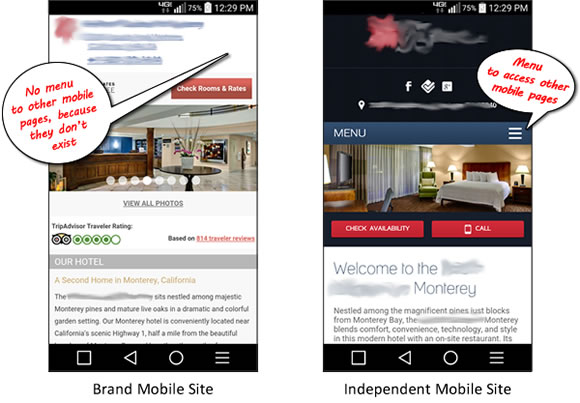
- Loss of indirect revenue and customer service: Often, the value of any hotel’s website–be it brand site or independent site–is measured in bookings that it produces. The hotel reviews how much revenue is produced through the booking engine and it’s clear whether or not there is value in that online platform. However, this doesn’t factor in other benefits of the site. As one hotel’s DOS put it: “If [the brand decision makers are] only focusing on revenue that the Independent Site is bringing in then they are missing the big picture. The amount of leads we receive from our Independent Site is astounding and these are the types of things Brand doesn’t consider.” In addition to lead generation, this hotelier also identifies the customer service need that the independent site fulfills:“I get several contact form submissions daily asking whether we have dvd players etc. This adds a lot of value for the user.” Unfortunately, the brand does not consider the added value of lead generation nor do they see the customer service role that these independent sites can play. These elements are greatly reduced or eliminated altogether once the brand eliminates the independent sites.
Input from Other Search Experts
Many concerned hoteliers have reached out to the SEO community for answers. Google won’t give a clear answer, but what about other industry experts? What do they say?
One hotelier that is part of a third party management company posted a query on the Moz Q&A Forum. Moz is one of the most well-respected resources for all things SEO. He asked:
I work for a large 3rd party management company and we use vanity websites to help us market our hotels. They provide us the ability to better manage our content as well as provide value to our customers versus the brand site. An example would be
Based on my reading of Google’s guidelines I am concerned that our vanity site may be interpreted as such. Please advise if this is the case.
SEO consultant Alan Bleiweiss replied:
If a “vanity” web site is high quality, offers unique content, and that content is relevant to the specific search queries most accurate to the content provided on that site, it’s a perfectly valid site.
The same question about vanity sites and doorway pages was also posed on Google’s Webmaster Central Help Forum. In response, user ets writes:
Those aren’t doorways, no. There’s nothing deceptive or manipulative that I can see. An example of doorways is when you have a website with 200 pages on it, all of which have the same basic text but with place names switched out on each page (“Find a taxi in London”/”Find a taxi in New York City”). The pages are designed to rank separately, catch keyword searches, but funnel all the traffic to one destination.
Furthermore, that response provided by commenter ets was marked as “best answer” in the forum by Google employee Eric Kuan, who is a member of the company’s Search Quality Team.
Even Blue Magnet’s competitors at HeBS Digital have composed an argument for why hotels should not be concerned about their independent websites being classified as doorway pages, highlighting one major hotel brand’s attempt to use “this new Google Doorway Algorithm Update to try and discourage its franchisees from operating vanity websites.”
In fact, HeBS Digital sums up that hotel brand’s impetus for this decision perfectly:
“This attempt is nothing new for this major brand. The brand has devised a new strategy every several years to dissuade its own franchisees from undertaking valuable digital marketing efforts. Despite its best efforts, neither the brand – nor any major brand – has succeeded in shutting its franchisees out of this valuable revenue stream. These tactics haven’t worked in the past, and there remains no reason for branded and franchised hotels to be intimidated in the present.”
Eeny Meeny Miny Moe
In response to Google’s doorway page update, one hotel brand has established somewhat arbitrary criteria to determine the fate of each hotel’s independent website. Some independent sites will be allowed to live, while others must die, to allegedly save the brand from Google’s wrath.
Specifically, the criteria the brand uses to determine the value of the independent websites focuses on two areas:
- the independent site’s organic search visibility in relation to brand.com
- the independent site’s percent reservation contribution to the hotel’s total digital direct reservations
But if this major hotel brand has determined that any secondary website is a doorway page, then why does it matter whether the site has organic search visibility? Surely even the few independent sites that have been given brand approval still appear for at least some of the same search queries as their brand site counterpart. Why did they make the cut? And who cares how many reservations the independent site drives? If this brand considers any independent site a doorway page, then it would be considered a doorway page regardless of how beneficial the site is for the brand.
This arbitrary criteria and odd logic make it seem as though this evaluation is aimed at snuffing out independent sites the brand doesn’t like rather than staying true to any Google quality guidelines. Hotel franchisees have long struggled with restrictive brand marketing policies and have often bumped heads on issues like independent sites, which are beyond the brand’s capacity to fully monitor and control. While franchisees still need to abide by brand marketing and trademark standards, severing franchisees from an entire marketing outlet seems like overkill.
In the end, these franchisee hotels have entered into agreements with their parent brands, and, therefore, the hotels are bound to the terms of those contracts, including any policies concerning independent sites (if there are any). But whether there exists a policy that specifically addresses these sites or not, the question remains: why would any brand want to shut down a marketing channel for its hotels that is only serving to supplement the marketing of its official brand website?
How To Tell If You’re Dealing with a Doorway Page
Hotels’ independent websites are not considered doorway pages–not based on Google’s definition, nor based on Blue Magnet’s understanding of the update. If you still don’t believe me, let’s see how these independent websites stack up against Google’s own questions to test whether or not a site has been masquerading as a doorway page.
- Official Google Question #1: Is the purpose to optimize for search engines and funnel visitors into the actual usable or relevant portion of your site, or are they an integral part of your site’s user experience?
- Blue Magnet Response: In most cases, the independent websites provide a much better user experience than the official brand site: greater opportunity for local area content, richer detail, better functionality, and a better mobile experience. The independent sites do not exist solely to funnel traffic to other content on the brand site. The only time users leave the independent site is to book their room, which typically must be done through the brand’s official booking engine. Other than that, the sites exist as independent entities.
- Official Google Question #2: Are the pages intended to rank on generic terms yet the content presented on the page is very specific?
- Blue Magnet Response: Our independent sites are optimized for keywords specific to the hotel, as well as outlets and events related to to the property. Because the hotel is a local business, the content is often geographically targeted to the property’s specific location. Pages are never created to simply rank for generic terms. Our content is specific and relevant to the users of the hotel’s independent website.
- Official Google Question #3: Do the pages duplicate useful aggregations of items (locations, products, etc.) that already exist on the site for the purpose of capturing more search traffic?
- Blue Magnet Response: The independent site is not simply a duplicate of the official brand site. Yes, both sites provide information on the same product. Many sites have pages dedicated to this same hotel product too. Just look at any hotel page on Kayak, Expedia, Orbitz, TheKnot.com, or any other site that promotes these hotels. It would be ridiculous for Google to consider all those sites doorway pages. Yes, some information will be similar because the same product is being marketed via different channels, but good marketing isn’t reliant upon a single channel. These independent sites do not just duplicate the content of the brand website. The independent website provides a much better user experience, through more valuable content, better functionality and navigation, and greater variety of relevant information. We build sites for users, not search engines.
- Official Google Question #4: Are these pages made solely for drawing affiliate traffic and sending users along without creating unique value in content or functionality?
- Blue Magnet Response: Nope. Not even close.
- Official Google Question #5: Do these pages exist as an “island?” Are they difficult or impossible to navigate to from other parts of your site? Are links to such pages from other pages within the site or network of sites created just for search engines?
- Blue Magnet Response: The pages of our independent site never exist as “islands.” The web pages of the independent site all work together to form a comprehensive hotel experience almost entirely self-contained within the site. Each page provides useful content and interlinks naturally with other pages within the site. The only reason a visitor to the independent site would ever leave that domain is to book a room, which must be done through the brand’s official website. If hotels were able to employ a separate booking engine entirely, then the official brand website would become completely unnecessary.
Despite the clear marketing value that many franchise hotels see in their independent website, certain brands are now hamstringing their hotels’ opportunities under the guise of compliance with Google quality guidelines. These independent sites are not doorway pages. Instead, they offer a flexible platform that allows for ever-expanding, relevant content, immediate updates, local information, promotional opportunities, hotel personalization, and incremental revenue. Even if the brands feel these independent sites are providing very little return on the hotels’ investment, the fact that there still is at least some incremental return means that these sites are still beneficial to the hotel’s marketing efforts.
The Google Mind Reading Game
Every single Google update is wrapped in at least a little fog of ambiguity, including the doorway page update. There are no clear cut answers from the search giant. And that’s ok, because if Google ever gave an exact formula for how it determines the winners and losers in its rankings, spammers would make full use of that information to game the search engine results for their financial gain. The best way to approach an analysis of a site to determine if it meets Google’s Web Quality Guidelines is just to simply assess whether the site would be valuable to you as a consumer. If you were conducting research for an upcoming vacation and you arrived at an independent hotel website, would you feel like you got the information you were seeking? Or would you feel deceived? Is there rich, quality content? Or is the content pretty sparse and worthless? Most hotel independent sites are capable of providing more valuable content than their brand website counterparts, so why would Google consider penalizing those sites? The good news is, it won’t.
Google’s spam policies, when aggregated together and reduced to their simplest form, are really just the Golden Rule that you learned back in grade school: do unto others as you would have them do unto you. In webspeak: build websites for others as you would have others build them for you. No one likes to visit or navigate crappy websites. Google wants us to pay it forward and simply build good websites for others. If businesses follow that one simple rule, they’re be in the clear for not only this doorway page update, but just about any Google update that comes along.


